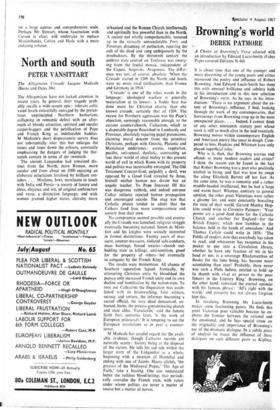North and south
PETER VANSITTART
The Albigensian Crusade Jacques Madaule (Burns and Oates 30s) The Albigensians have not lacked attention in recent years. In general, their tragedy prob- ably recalls a wide-screen epic: tolerant culti- vated South colourfully outraged by the preten- tious unprincipled Northern barbarians, collapsing in romantic defeat with an after- math of bloody atrocities, spiritual and secular carpet-baggers and the petrification of Pope and French King as indefensible baddies. M Madaule's short dispassionate survey does not substantially alter this but enlarges the issues and tones down the colours, constantly emphasising the dangers of judging the thir- teenth century in terms of the twentieth.
The ancient Languedoc had remained dis- tinct from the North, more Roman, more secular and from about an 1000 enjoying an elaborate eclecticism fertilised by brilliant out- siders . . . Moslems, Jews, merchants in touch with India and Persia—a society of luxury and ideas, elegance and wit, of original architecture and verse, a distinctive language; and with women granted higher status, chivalry more urbanised and the Roman Church intellectually and spiritually less powerful than in the North.
A society not wholly comprehensible, summed up in the virtually untranslatable Pretz and Paratoge, dreaming of perfection, rejecting the cult of the dead and sung ambiguously by the troubadours. By the thirteenth century the embryo state centred on Toulouse was emerg- ing from the feudal mosaic, independent of the Capets, Angevins, Aragonese. The differ- ence was not, of course, absolute. 'When the Crusade started in 1209 the North and South were no more rival civilisations than France and Germany in 1914.'
'Crusade' is one of the vilest words in the language: ideological warfare is generally materialism at its lowest: a Teddy bear has done more for Christian charity than any known crusade, certainly that of 1209. The excuse for Northern aggression was the Pope's objection, seemingly reasonable enough, to the curious counter-church, Catharism, which to a disputable degree flourished in Lombardy and Provence, absolutely rejecting papal pretensions, claiming moral descent from the primitive Christians, perhaps with Gnostic, Platonic and Manichean undertones: ascetic, vegetarian, pacifist, anti-sexual, dualistic, contrasting an 'out there' world of ideal reality to this present world of evil in which Rome with its property and politics was inextricably entangled. The Old Testament Creator-God, palpably a devil, was opposed by a Good God revealed by Jesus, himself neither human nor divine but an angelic teacher. To Pope Innocent III this was dangerous rubbish, and indeed extreme Cathar initiates rejected human propagation and encouraged suicide. The snag was that Catholic priests tended to admit that the Cathars lived lives more compassionate and austere than their own.
No compromise seemed possible and eventu- ally the Crusade was launched, religious struggle eventually becoming national. Simon de Mont- fort and his knights were scarcely interested in formal distinctions. Twenty years of mas- sacre, counter-massacre, violated safe-conducts, mass buntings, forced treaties—church out- bidding state in killings, anti-semitism, greed for the property of others—led eventually to conquest by the French King.
The results were momentous. All chance of Southern separatism lapsed. Ironically, by attempting Christian unity by bloodshed the papacy only increased French unity and its own decline and humiliation by the nation-state. To root out Catharism the Inquisition was estab- lished with its brainwashing, false witness, secrecy and torture, the informer becoming a sacred official, the very dead denounced, ex- humed, burnt, the process contaminating church and state alike. 'Fanaticism,' said the fanatic Saint Just, centuries later, 'is the work of European priestcraft.' It is tempting to see the European revolutions as in part a counter- terror.
M Madaule has careful regard for the avail- able evidence, though Catharist records are naturally scanty : history being at the disposal of the victors. He tells his sad tale within the larger story of the Languedoc as a whole, beginning with a mention of Hannibal and ending with one of Jaures. Hoary cliches, 'the greatest of the Mediaeval Popes,' 'The Age of Faith,' take a beating. One can understand better the ruthless blood-lettings that periodi- cally convulse the French state, with rulers under whom politics are never a matter of course but a matter of nerves.






























 Previous page
Previous page